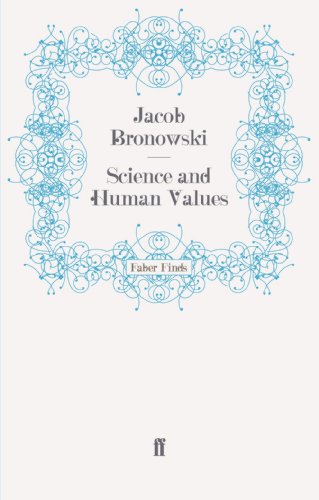Evolution from Inner-Philsophy to Natural Philosophy
There have always been two ways of looking for truth. One is to find concepts which are beyond challenge, because they are held by faith or by authority or the conviction that they are self-evident. This is the mystic submission to truth which the East has chosen, and which dominated the axiomatic thought of the scholars of the Middle Ages. So St. Thomas Aquinas holds that faith is a higher guide to truth than knowledge is: the master of medieval science puts science firmly into second place.
But long before Aquinas wrote, Peter Abelard had already challenged the whole notion that there are concepts which can only be felt by faith or authority. All truth, even the highest, is accessible to test, said Abelard: 'By doubting we are led to inquire, and by inquiry we perceive the truth.' The words might have been written five hundred years later by Descartes, and could have been a recipe for the Scientific Revolution. We have the same dissent from authority in the Reformation; for in effect what Luther said in 1517 was that we may appeal to a demonstrable work of God, the Bible, to override any established authority. The Scientific Revolution begins when Copernicus implied the boldeier prop>osition that there is another work of God to which we may appeal even beyond this: the great work of nature, e. No abibsolute statement is allowed to be out of reach of the test, that its consequence must conform to the facts of nature.^^
The habit of testing and correcting the concept by its consequences in experience has been the spring within the move¬ ment of our civilization ever since. In science e and in art and in self-knowledge we explore and move c constantly by turnI ing to 5 the world of sense to ask. Is this so? This is the habit of truth, always minute yet always urgerent, which for four hundred years has entered every action of ours; and has made our society and the value it sets on man, as surely as it has made the linotype machine and the scout knife, and King Lear and the Origin of Species and Leonardo's Lady with a Stoat.
Notes:
Summary of human culture moving from introspectively-revealed knowledge of the Dark Ages to the outward-viewing philosophy of naturalism.
Folksonomies: history philosophy empiricism naturalism
Taxonomies:
/science (0.640132)
/science/social science/philosophy (0.458952)
/science/physics/space and astronomy (0.451723)
Keywords:
Natural Philosophy Summary (0.989088 (positive:0.468963)), St. Thomas Aquinas (0.970252 (positive:0.811598)), science puts science (0.944183 (positive:0.635777)), Scientific Revolution (0.943964 (positive:0.227413)), truth (0.819522 (positive:0.301086)), Peter Abelard (0.777563 (neutral:0.000000)), human culture (0.769368 (positive:0.468963)), introspectively-revealed knowledge (0.763775 (positive:0.468962)), Dark Ages (0.763513 (positive:0.468963)), outward-viewing philosophy (0.763251 (positive:0.468963)), axiomatic thought (0.761864 (neutral:0.000000)), demonstrable work (0.755807 (neutral:0.000000)), mystic submission (0.746268 (positive:0.359285)), move¬ ment (0.744272 (negative:-0.404875)), Middle Ages (0.740651 (neutral:0.000000)), higher guide (0.739032 (positive:0.811598)), linotype machine (0.738543 (neutral:0.000000)), boldeier prop> (0.726795 (neutral:0.000000)), King Lear (0.726578 (positive:0.205502)), abibsolute statement (0.723355 (neutral:0.000000)), great work (0.722965 (positive:0.293493)), scout knife (0.722208 (neutral:0.000000)), authority (0.703071 (negative:-0.326594)), faith (0.624704 (positive:0.429967)), habit (0.588433 (negative:-0.344615)), concepts (0.581213 (negative:-0.324192)), test (0.576135 (positive:0.457422)), God (0.575683 (negative:-0.271346)), naturalism (0.560751 (positive:0.468963)), Stoat (0.559972 (positive:0.205502))
Entities:
Peter Abelard:Person (0.924764 (neutral:0.000000)), St. Thomas Aquinas:Facility (0.910317 (positive:0.811598)), Natural Philosophy:PrintMedia (0.666817 (positive:0.468963)), master of medieval science:Degree (0.645592 (positive:0.635777)), King Lear:Person (0.603066 (positive:0.205502)), Stoat:City (0.560259 (positive:0.205502)), Copernicus:Person (0.542877 (neutral:0.000000)), Descartes:Person (0.525507 (neutral:0.000000)), Luther:Person (0.517899 (neutral:0.000000)), Bible:Organization (0.490127 (neutral:0.000000)), four hundred years:Quantity (0.490127 (neutral:0.000000))
Concepts:
Middle Ages (0.977955): dbpedia | freebase | opencyc
Philosophy (0.939071): dbpedia | freebase | opencyc
Renaissance (0.932930): dbpedia | freebase | opencyc
Scientific method (0.823713): dbpedia | freebase
Science (0.707576): dbpedia | freebase | opencyc
Aristotle (0.664969): dbpedia | freebase | opencyc | yago
Scholasticism (0.589181): dbpedia | freebase
Epistemology (0.573377): dbpedia | freebase | opencyc





